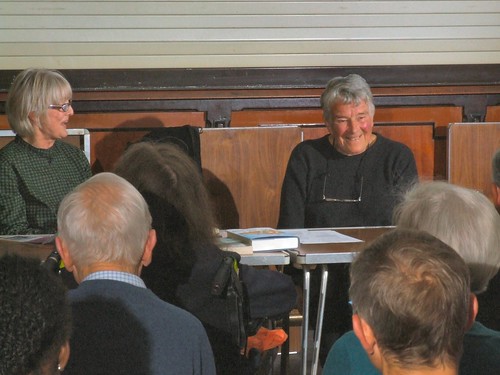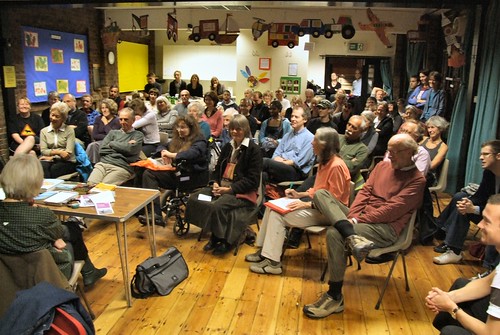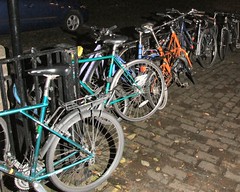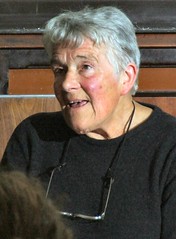
We knew that Dervla would be popular, and were delighted that more than 50 people turned up to hear her fresh and candid views on nearly half a century of travelling and writing since her first book, Full Tilt: Ireland to India with A Bicycle, came out in 1965.
Anne Boston of CCC welcomed Dervla, and asked to her tell us about her new book The Island that Dared: Journeys in Cuba.
Dervla said that the Cuban journey arose because her daughter Rachel (Dervla’s companion on many expeditions) hadn’t yet travelled far afield with her own three daughters. Dervla had been planning a trip to North Korea, but they decided Cuba would be safer. The first trip to Cuba with daughter and granddaughters: 6, 8 and 10 consisted of five weeks of trekking, bus and truck travel. They saw things that other people would not have seen: they tried a trek on the coast which they discovered was a very beautiful, but barren area with little food to spare. Dervla trekked there again later without the family.
Dervla went to Baracoa: almost rain forest with a few native indians, where she had trouble getting away from park rangers.
Cuba is good cycling country in terms of flatness, but it was too hot to cycle: on the third trip in October, she had heatstroke.
Dervla concluded that we have a lot to learn from Cubans: we need to give up the throw-away society. She also regretted that her lack of language learning skills is a handicap as a traveller. (But I wondered what more she would find out if she did speak the local language?)

Beginnings
Anne invited Dervla to go back to the beginning, when she was given an atlas and a bike for her 10th birthday and decided to ride to India. Dervla eventually made the trip at 31 and it cost her £64. Subsequently she travelled in Coorg with 5 year old Rachel, then Pakistan, including a winter in Balthistan to the disbelief of an official who deemed it to be too cold. Dervla prefers cold weather, e.g. Siberia where she injured her right leg – it’s always the right one, she said. She added that she has had no accidents on a cycle, but had her nearest brush with death on a terrifying downhill ride in Laos where the brakes didn’t work, and the road was full of potholes and with vertical drops on either side.
In Balthistan, on a steep path with landslides, she looked back to see Rachel standing in the middle of a landslip, instructing a mullah where Ireland is on the globe! She did have bad moments about her daughter’s safety. But she deplored our society in which we instill fear into children by not allowing them to go out alone: how will they be able to cope as adults?
Travel writer or historian?
Asked whether whether she sees herself as a historian. Dervla gave a an unequivocal “no”. History in the making? Dervla clarified: a travel writer must stick to the facts, they provide material for future historians in the form of sociological observations. But at a meeting of travel writers, she found that while all the oldies took the same stance, the younger ones saw nothing wrong in embroidering or inventing.
Dervla writes conversations down immediately after leaving the subject and takes home hundreds of pages of notes.
Where is your home?
Dervla always likes going home to Ireland. But some places might do as an alternative, e.g. Coorg and Baracoa. She has lived in Nepal, working with Tibetan refugees, but was thrown out after 5 months.
The role of the Bike on your trips?
Being on a bike makes you feel like an insider; riding it is an incidental attraction.
When did you start writing ?
Dervla had always planned to write a book. She tried a few novels, then a completed book about cycling in Spain was rejected. Full Tilt was a breakthrough.

Poverty in Cuba?
The Cuban manage without ‘luxuries’ which are seen as essential here. Cuba has the best system for dealing with hurricanes. Up to a million people are evacuated before the strike and they rehearse each May. This is possible because cost is not an issue; the lack of options saves lives. However, much fertile land is unused and there are too many imports.
Dervla’s best journey
Walking with a mule in Ethiopia was the best physical feat. The people are wonderful.
Do you prepare in advance?/ are you sad to pass on after making friends?
Preparations are serendipitous; there is no advance day-by-day planning. Dervla reads about the history and political problems in advance and then again after the trip. Friendships on journeys are by nature temporary, but some of the people she met have come to Ireland to stay.

Advice about travelling with children?
In Cuba, children are carried in home-made wooden trailers – why not do the same here?. In her view children are best suited to travelling between 5 and 8. But travelling with 18 year old Rachel affected relationships with the locals (2 adults form a separate unit). After many encounters with strangers in foreign lands she agreed, her judgement of people is almost always sound. And (no boast, a statement of fact) she would describe herself as not brave but fearless.
Dervla was asked about her bike – does she upgrade regularly?
Dervla says she (herself) needs an upgrade. Her present bike is called Mackie, it has 12 gears and she’s had it for 12 years, with a comfortable old saddle, it’s a standard roadster. Despite having cycled halfway across the globe through (for instance) Persia and Afghanistan she still can’t fix a puncture! She waits for a kind passer by to help. Often being a woman can be an advantage: you are treated with great respect especially in Muslim countries.
What about exploiting local people?
Dervla always tells people she’s writing a book. She changes all the names. Where possible she sends people the book (if they read English). She found the Andeans the saddest people, who look through strangers as if they are invisible.
What next?
Dervla plans to take a bedsit for six months each in Palestine and Israel, and will record her encounters with the people she meets and conditions she finds there.
End of the evening
Anne thanked Dervla and after prolongued applause, Dervla sat signing Cuba books and chatting to her fan club.
Photos by Lionel Shapiro.


